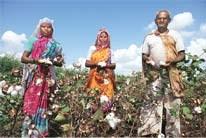
Increasing demand for Fair Trade goods globally has also led to growth in the Indian Fair Trade market. Numerous companies have worked to recruit suppliers in India such as farmers and handicrafts producers into businesses that promote Fair Trade and supply global demand. More recently, however, companies are also looking at catering to domestic demand for Fair Trade products. This has in fact led to the growth of Shop for Change, India’s first domestic Fair Trade labelling organization, which has resulted in controversy within the industry.
Fairtrade proponents in India are divided on whether to align with global labels or create their own
A rift seems to be developing in the Fairtrade movement in India even before it has taken off fully. Ranged on one side is a domestically-bred newcomer, Shop For Change and on the other, the global veteran — Fairtrade Labelling Organisations International (FLO).
As the name suggests, the Fairtrade movement is an attempt to make trade “fairer” by paying disadvantaged producers a price for their goods that would enable them to recover costs and generate profit. The producer, in turn, has to fulfil certain conditions like following sustainable agricultural practices. What began as a niche movement in the West has been gradually gathering pace, with global sales of Fairtrade products (select agricultural produce such as bananas, coffee, tea and spices, and handicrafts) touching $4.1 billion in 2008, a 22 per cent jump over the previous year.
India has been part of the Fairtrade movement mainly as a supplier of goods for the Western market. But the growing purchasing power of consumers here gave rise to the idea that the country could also be a market for Fairtrade produce. There was also the realisation among Fairtrade goods producers that they needed to look beyond the Western markets to grow. This is what led to Shop For Change, an Indian not-for-profit venture set up by the International Resources for Fairer Trade (IRFT) from India and Traidcraft Exchange of the UK, launching the first – and so far, only – domestic Fairtrade certification label in 2009. “The Indian market has evolved greatly and we wanted to leverage the opportunity created by the economic boom,” says Seth Petchers, CEO of the company.
Shop For Change sources and certifies Fairtrade cotton from small and medium farmers. This involves working with farmer groups willing to conform to Shop For Change norms, such as sharing benefits equally among members and following sustainable agriculture practices. It then connects the farmers with Fairtrade buyers who, apart from the Fairtrade price, also pay them a capacity building premium, which is 15 per cent of the market value of the crops sold. The farmers are also supposed to receive other benefits like training, wage protection and safe workplaces, which Shop For Change must ensure. Any apparel made with the farmers’ cotton would carry the Shop For Change mark, indicating the use of Fairtrade material. Buyers now include designer Anita Dongre and Mother Earth (a brand owned by Industree in which Future Group’s Kishore Biyani holds a 43 per cent stake), Celebwear and No Nasties. Shop For Change recently started certifying mango, cashew and amla, and now works with over 7,000 farmers across Maharashtra, Gujarat, Andhra Pradesh, Orissa and Rajasthan.
But not everybody perceives the Shop For Change process as “fair”. Tomy Mathew, a veteran member of the Fair Trade Alliance of Kerala, which exports Fairtrade agricultural produce certified by FLO, makes no bones about his displeasure with the manner in which the movement seems to be shaping in India. “I’m sceptical about this new ‘Fairtrade’. It is very important to convey a consistent message about Fairtrade and to align with the global movement. By having different certifying authorities, you are merely confusing the customer and killing the concept even before it is properly launched,” he says. FLO is planning to sell Fairtrade products certified by it in India by the end of 2011.
Petchers, however, brushes aside this criticism. “There are millions of farmers here who need help. As long as the producer gets a fair price, multiple labels shouldn’t matter. No one organisation should monopolise the movement,” he says. “Our ultimate goal is to provide consumers with a basket of Fairtrade goods so that we’re not just giving an opportunity to choose Fairtrade when one shops for this product or that, but rather an opportunity for consumers to adopt a Fairtrade lifestyle,” he adds.
The different stands taken by Mathew and Petchers echo the dissonance in the global movement that has begun to capture popular mind space. Though Fairtrade began in the early 20th century, through the sale of goods in churches initially and later, at designated “world shops”, it was with labelling, or certification, that the movement gained ground. This was because labelling allowed Fairtrade produce to move out of world shops and on to supermarket shelves and the mainstream market, where more customers could buy them. But the increasing popularity of the movement also saw more Fairtrade certifying bodies and labels springing up, with opinions divided over the efficacy of having multiple Fairtrade labels.
“Having multiple labels means more choice for the consumer. But it also means each label has to spend time, money and energy on promotion, which could otherwise be put to better use,” says Arun Raste, a banker, who took a sabbatical to work with the Fairtrade movement and helped set up Shop For Change.
“I agree that different labels might confuse the consumer and that we need to align with the global movement, but currently there is no one apart from Shop For Change certifying Fairtrade cotton in India, which we use in our garments,” adds Neelam Chibber, founder of Industree.
Globally, there are multiple certifying labels, though many of their underlying principles are the same. However, there is no super regulator governing the mushrooming of labels or auditing them, abroad or in India.
http://www.business-standard.com/india/news/what%5Cs-inlabel/422163/
